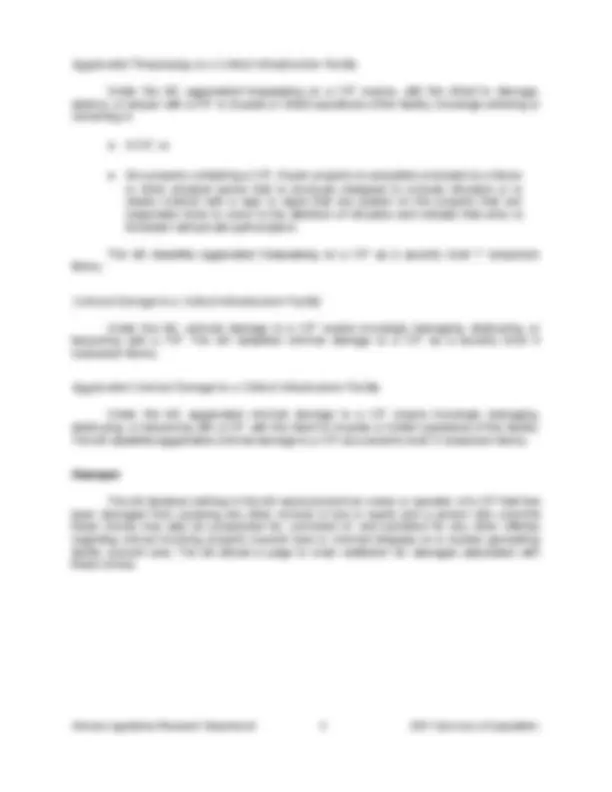



Study with the several resources on Docsity

Earn points by helping other students or get them with a premium plan


Prepare for your exams
Study with the several resources on Docsity

Earn points to download
Earn points by helping other students or get them with a premium plan
Community
Ask the community for help and clear up your study doubts
Discover the best universities in your country according to Docsity users
Free resources
Download our free guides on studying techniques, anxiety management strategies, and thesis advice from Docsity tutors
Sb 172 is a kansas bill that amends the criminal code by eliminating the crime of tampering with a pipeline and establishing four new crimes: trespassing, aggravated trespassing, criminal damage, and aggravated criminal damage to critical infrastructure facilities (cifs). The bill also allows for restitution for property damage. The right to peacefully protest is protected. Cifs include various types of energy, water, telecommunications, and transportation facilities.
What you will learn
Typology: Study notes
1 / 3

This page cannot be seen from the preview
Don't miss anything!


SB 172 amends the Kansas Criminal Code regarding crimes involving property by eliminating the crime of tampering with a pipeline and establishing four new crimes: trespassing on a critical infrastructure facility (CIF), aggravated trespassing on a CIF, criminal damage to a CIF, and aggravated criminal damage to a CIF. The bill also allows a judge to order restitution for property damage to any victim of the four new crimes. Right to Peacefully Protest The bill includes a “whereas” clause that states the provisions of the bill protect the right to peacefully protest for all Kansans and citizens of the four sovereign nations within the state’s borders while also protecting the critical infrastructure located within the state. Definition of Critical Infrastructure Facility The bill defines a CIF, as used in the bill, as any: ● Petroleum or alumina refinery; ● Electric generation facility, substation, switching station, electrical control center, electric distribution or transmission lines, or associated equipment infrastructure; ● Chemical, polymer, or rubber manufacturing facility; ● Water supply diversion, production, treatment, storage, or distribution facilities and appurtenances, including, but not limited to, underground pipelines and a wastewater treatment plant or pump station; ● Natural gas compressor station; ● Liquid natural gas or propane terminal or storage facility; ● Facility that is used for wireline, broadband, or wireless telecommunications or video services infrastructure, including backup power supplies and cable television headend; ● Port, railroad switching yard, railroad tracks, trucking terminal, or other freight transportation facility; ● Gas processing plant, including a plant used in the processing, treatment, or fractionation of natural gas, propane, or natural gas liquids; ● Transmission facility used by a federally licensed radio or television station;
● Steelmaking facility that uses an electric arc furnace to make steel; ● Facility identified and regulated by the U.S. Department of Homeland Security Chemical Facility Anti-Terrorism Standards program, facility operated by the Office of Laboratory Services under the supervision of the Secretary of Health and Environment, or the National Bio and Agro-Defense Facility or Biosecurity Research Institute at Kansas State University; ● Dam that is regulated as a hazard class B or class C dam by the state or federal government; ● Natural gas distribution utility facility, or natural gas transmission facility, including, but not limited to, pipeline interconnections, a city gate or town border station, metering station, belowground or aboveground piping, a regular station, or a natural gas storage facility; ● Crude oil, including Y-grade or natural gas liquids, or refined products storage and distribution facility, including, but not limited to, valve sites, pipeline interconnections, pump station, metering station, belowground or aboveground pipeline or piping, and truck loading or offloading facility; or ● Portion of any belowground or aboveground oil, gas, hazardous liquid, or chemical pipeline, tank, railroad facility, or any other storage facility that is enclosed by a fence or other physical barrier or clearly marked with signs prohibiting trespassing that are obviously designed to exclude intruders. Crimes Related to Critical Infrastructure Facilities The bill eliminates the crime of tampering with a pipeline and creates four new crimes. Trespassing on a Critical Infrastructure Facility Under the bill, trespassing on a CIF means, without consent of the owner or the owner’s agent, knowingly entering or remaining in: ● A CIF; or ● Any property containing a CIF, if such property is completely enclosed by a fence or other physical barrier that is obviously designed to exclude intruders or is clearly marked with a sign or signs that are posted on the property that are reasonably likely to come to the attention of intruders and indicate that entry is forbidden without site authorization. The bill classifies trespassing on a CIF as a class A nonperson misdemeanor.